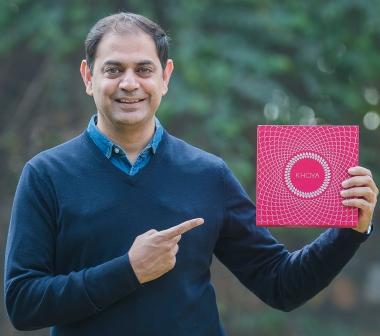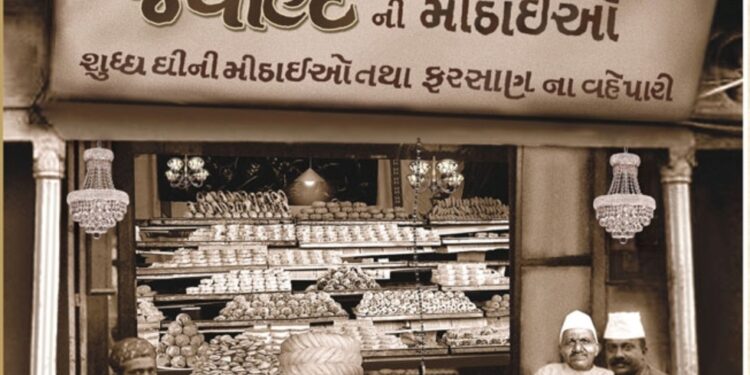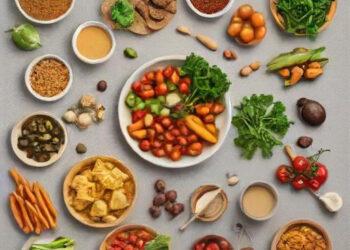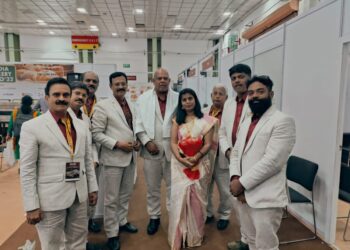THIS ARTICLE IS POWERED BY

By Tanisha Saxena
In Indian culture, sweets have a special place and are frequently linked to feelings, joyous occasions, and hospitality. They play a crucial role in many events, such as festivals, weddings, birthdays, and others. In Indian culture, offering sweets is a sign of warmth and hospitality and is done to convey feelings of delight, love, and well wishes.
The variety and richness of Indian sweets are enhanced by the local sweet specialties found in each region of the country. Sweets have a big impact on the country’s cultural and social fabric, whether it’s the customary ladoo at Diwali or the rasgulla at a Bengali wedding. Delving into the realm of sweetness we bring a sweet story about the prominent trends, growing demand for healthier options, and more.
Khoya:
Khoya, a high-end mithai brand, was introduced in 2016 by Sid Mathur, a member of the Impresario group. They specialize in crafting visually appealing boxes of artisanal sweets, using only fresh and wholesome ingredients. We had the opportunity to engage in a conversation with the founder Sid Mathur. He says, “Artisanal sweets are the sweet symphonies of a new India, where quality, authenticity, and innovation harmonize to create an irresistible future for the sweet industry. Picture this: handcrafted delicacies lovingly prepared using age-old techniques and the finest ingredients, a sensory journey that transcends the ordinary.”
In this landscape of sweets, each bite unveils a world of flavor exploration. Artisanal sweet makers are like culinary artists, weaving unique flavors and ingredients into their creations. Whether it’s saffron-infused delights or fusion sweets that blend tradition with innovation, these artisanal treasures cater to the ever-evolving palates of modern consumers who crave distinct and unforgettable taste experiences.
“But there’s more than just a burst of flavor,” he quips! further explaining, “It’s a commitment to well-being. As health consciousness takes center stage, artisanal sweets answer the call with healthier alternatives and natural ingredients. These sweets aren’t just indulgences; they’re conscientious choices that align with the desires of those who want to savor without guilt. And what’s sweeter than supporting local communities and the environment? Artisanal sweet makers source locally, championing regional ingredients and flavors that pay homage to India’s diverse culinary heritage. Sustainability isn’t just a buzzword; it’s a promise. But the magic doesn’t stop there. Personalization is the secret ingredient. We try cater to individual preferences, creating bespoke confections that turn every occasion into a sweet celebration. Birthdays, weddings, or simply the joy of gifting – each sweet is a story written with care.”
Undoubtedly, the appeal goes beyond taste; it’s a journey through India’s cultural tapestry. Artisanal sweet makers are guardians of tradition, highlighting regional flavors and techniques that celebrate the rich diversity of this incredible land. Every sweet tells a tale, and every bite is a step into India’s heart.
Bhim Chandra Nag
As we savor this sweet revolution, it’s essential to remember that while artisanal sweets shine brightly, the classics and mass-produced favorites will always have their place in our hearts. In the Indian sweet bazaar, there’s room for tradition, innovation, and everything in between. So, indulge your sweet tooth and let the future of sweets in India be a delicious blend of old-world charm and modern delights.
Here comes, Bhim Chandra Nag – Bhim Chandra Nag stands as an illustrious confectionery haven nestled in the heart of Kolkata, West Bengal, India. It basks in the limelight for its mastery in crafting traditional Bengali sweets, revered with profound admiration both by the local connoisseurs and curious travelers who grace its doors. Within this hallowed establishment, patrons are treated to an array of signature delicacies, each a testament to culinary artistry and unwavering dedication. Rasgulla, Sandesh, and GulabJamun, among others, grace the menu, their creation steeped in the embrace of centuries-old recipes and only the finest, handpicked ingredients. In every delectable morsel, it encapsulates the very soul of Bengal’s saccharine traditions, perpetuating a legacy of culinary excellence that transcends generations.

In a conversation with the owner Goutam Nag who belongs to the fifth generation, counting from Bhim Chandra Nag and one of the proprietor of this shop, informs, “MishtiDoi is a speciality and hugely popular in our shop. The Doi/Dahi is very creamy and heavy in texture, made by reducing 80l of milk to just 60 litres! We also have variations like Mango Dahi, ZafraniDahi (by order only). Sweets/Sandesh specialities include, Sakuntala(by order),Victoria(by order), Dilkhush, Nehru(by order), Monohara, AbarKhabo, Badshabhog, ButterScotch, Alphanso Mango, Chocolate. During Bhai Phonta sale, we have new specialities like Khaja, LobongoLotika, KheerKanti, Parakheer, Balushai, which is only unique to that time.”
He believes that no matter what our traditional roots find its way. They also make Modak and DarbeshLaddu(available throughout the year) during Ganesh Chaturthi. According to him, the future is quite unique and suprising. They believe that flavour and authenticity matters the most. And Bhim Chandra Nag never compromise on quality standards.
Shri Rajasthan Namkin& Sweets
Traditional sweets continue to captivate people’s hearts for various compelling reasons. In an interesting interaction with Vimal Garg, the Founder of the brand tells why he has observed that traditional sweets are always trending. He begin, “Firstly, they evoke a powerful sense of nostalgia, reminiscent of cherished childhood memories, offering a comforting and familiar taste of the past. Secondly, their enduring popularity can be attributed to the authentic and time-tested recipes that infuse these sweets with exquisite, unbeatable flavors. These age-old culinary techniques ensure a delightful and genuine taste that consistently wins people’s appreciation. Moreover, traditional sweets often hold a profound cultural and historical significance. They are deeply rooted in the traditions and rituals of various societies, making them an indispensable part of celebrations and customs, fostering a sense of belonging and continuity.”
Shri Rajasthan Namkin & Sweets has a gamut of mouthwatering sweets, ranging from Ajmer’s famous SohanHalwa to regular kajukatli. He explains, “SohanHalwa is a rich and sweet dessert that’s particularly renowned in Ajmer and other parts of Rajasthan. It’s made from ingredients like wheat, ghee (clarified butter), sugar, and nuts. This delectable treat is known for its unique texture and is often enjoyed during special occasions and festivals. Similarly, during rakshabandhan we have huge demand for ghewar which is again a unique sweet in Rajasthan. I would say that traditional sweets are always there holding us and binding us all. There might be a section of society that wants sugar free or fusion sweets but in essence, we always find solace in nostalgia.”
Khushi Ram’s and Sons food
Punjabi sweets are not mere confections; they are a celebration of flavors, a testament to cultural richness, and a showcase of culinary craftsmanship. With every bite, they tell a story of tradition, innovation, and the sheer joy of savoring life’s sweet moments. “Milk, the heart and soul of Punjabi sweets, metamorphoses into creamy delights like burfi, kalakand, and peda. Each bite is a testament to the artistry of milk’s transformation into something heavenly. But it’s the generous use of nuts and dry fruits that adds a magical crunch and a symphony of flavors. Almonds, pistachios, and cashews dance in harmony, creating an orchestra of taste and texture that’s truly exquisite,” shares Akshat Gupta, owner.
He further explain, “We want to work on the rebranding of our shop. With time, things have changed and undeniably there’s competition. This is because the age old sweet shops aren’t experimental enough. I want to carve out a niche there. I want to create an experiential sweet shop by rebranding. Picture this, when you enter a sweet shop and someone is there to greet you and then another person is explaining you the specialities and another is ready to pack the sweets for you. Every one is giving you a vibe of the traditional roots we all have. Isn’t it magical? That’s exactly what I want to do. I am on it in fact. I hope this happened soon.”
Jayhind Sweets
Ahmedabad, a vibrant city in the state of Gujarat, India, boasts a rich culinary heritage celebrated for its array of delectable sweets. We got in touch with Aniket Patel, Proprietor of Jayhind Sweets to know what’s trending and are there any challenges in the market.
He says, “During festive occasions like RakshaBandhan and Teej, Ghevar takes the spotlight. This disk-shaped, fried delicacy is soaked in sugar syrup and adorned with almonds and pistachios, making it a true indulgence. Mohanthal, a traditional Gujarati sweet, is crafted from besan (gram flour), ghee, and sugar. Its opulent, dense texture is infused with cardamom and garnished with slivered almonds. And yet another famous sweet, Malpua is a sweet pancake-like dessert, is concocted from flour, milk, and sugar, deep-fried to perfection, and then immersed in sugar syrup, rendering it a delightful treat. For those seeking creamy delights, Basundi offers a luscious milk dessert often enhanced with cardamom and saffron, simmered until achieving a thick consistency and typically savored chilled.”
He observes that cultures dictate our food preferences and when it comes to sweets nobody compromises. Customers can’t compromise on quality, hygiene and flavours. He opines; “Ahmedabad’s diverse culinary landscape, invites the exploration of a wide spectrum of flavors and culinary traditions. We believe that experimentation is normal now and we have to keep innovating to compete not just at the local level but globally as well. You see people travel across the world and taste different things so they also want something fresh and out of the box.”
Vijay Sweets
The popularity of vegan sweets has surged lately due to a rise in people embracing vegan diets and seeking plant-based alternatives. This surge is influenced by multiple factors, including health consciousness, environmental awareness, and ethical concerns. Consequently, there’s an expanding market for vegan candies and confections, prompting numerous companies to diversify their vegan offerings to meet this rising demand. This trend is beneficial for individuals committed to veganism or those simply aiming to decrease their consumption of animal-derived products. Guess what, Vijay Sweets store is India’s first vegan sweets shop in India. Speaking about the trend and challenges, Aravindan, Proprietor of the brand, tells, “The popularity of vegan sweets has surged lately due to a rise in people embracing vegan diets and seeking plant-based alternatives. This surge is influenced by multiple factors, including health consciousness, environmental awareness, and ethical concerns. Consequently, there’s an expanding market for vegan candies and confections, prompting numerous companies to diversify their vegan offerings to meet this rising demand. This trend is beneficial for individuals committed to veganism or those simply aiming to decrease their consumption of animal-derived products.”
As per Aravindan, Vijay Sweets store is India’s first vegan sweets shop and that’s why they have no one else to be compared to. Having said that, the journey is mostly self discovering and thriving. They are getting good number of orders and hope to expand their reach in near future.
In conclusion, traditional sweets stand the test of time, continuing to captivate people worldwide due to their nostalgia-inducing qualities, authentic flavors and cultural importance. But at the same time experimental results like artisanal and vegan sweets are also carving out a niche for themselves in the market. The coming years will be full of surprises and successes for the players in the market if innovation is the mantra.







